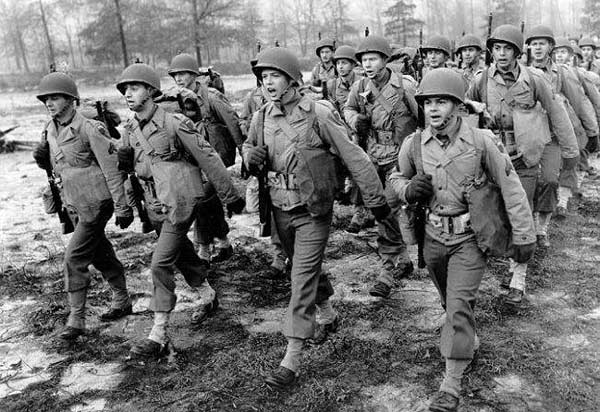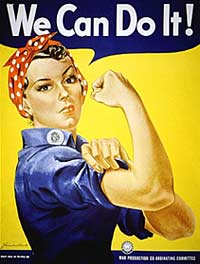 In contrast to today's all-volunteer forces, America's military arm in World War II was directly tied to the body politic.
In contrast to today's all-volunteer forces, America's military arm in World War II was directly tied to the body politic.The march to war, from Bonaparte to Bush
Stanford historian David Kennedy, this year's Jefferson Lecturer, sees America's all-volunteer military as lean, lethal, and far too easy to send into battle
| 12 February 2009
BERKELEY — Writing in The New York Times in July 2005 — when the steady, two-year drumbeat of U.S. military deaths in Iraq had passed the 1,750 mark, and the mantra “support the troops” had assumed the power of a national talisman — Pulitzer Prize-winning historian David Kennedy greeted readers with something like the rhetorical equivalent of a shot across the bow.
“The United States,” began his Times piece, “now has a mercenary army.” Acknowledging that some would find such a characterization “offensive,” Ken-nedy wrote that “neither the idealism nor the patriotism of those who serve is in question here.” His own fears about standing armies, he explained, mirrored those of the nation’s founders: They represented “a standing invitation to the kind of military adventurism” associated with Napoleon Bonaparte, “whom [Thomas] Jefferson described as having ‘transferred the destinies of the republic from the civil arm to the military arm.’”
 David Kennedy
David Kennedy Fittingly, Kennedy seized the opportunity of the Berkeley Graduate Council’s 2009 Jefferson Memorial Lecture to flesh out the arguments of that Times op-ed — which ran under the provocative headline “The Best Army We Can Buy” — and to confirm that many readers were, indeed, offended by his contrarian use of the “m” word. To Kennedy, the angry tone and tenor of the reaction merely underscored the divide between civil society and the warrior class it pays to shoulder arms on its behalf.
“I have never received the volume of correspondence that I did for this piece, and I have never received as much hate mail,” reported Kennedy, noting that his writing often appears in newspapers and other public venues. What he found most disturbing, he added, “was how completely marinated [the letter-writers] were in a bitter, venomous cultural resentment” toward “the presumptively effete professoriat” and “supposedly clueless institutions” like the Times and Stanford, his longtime academic base.
Such resentment, Kennedy suggested, is understandable given the demographics of today’s all-volunteer military, which not only represents a small sliver of the U.S. population but is “disproportionately composed of racial, ethnic, and socioeconomic minorities.” The men and women who serve in the armed forces now “surely do not make up the kind of citizen army that this society fielded two generations ago,” and who — until President Nixon pulled the plug on military conscription in 1973 — came from a much broader spectrum of American society.
The professionalization of U.S. fighting forces over the past three decades, warned Kennedy, is “unsettling,” and for reasons that transcend issues of social inequity and comity. “It means,” he declared, “that history’s most powerful military force ever can be sent into battle in the name of a society that scarcely breaks a sweat.”
As indeed, he suggested, it has.
From Vietnam to Baghdad
Last week’s lecture, delivered to a full house in Barrows Hall’s Lipman Room, was formally titled “An Invitation to Struggle: The Constitution, the Military, and Political Accountability.” But a better summary of his remarks, Kennedy proposed, would be “that what I want to explore is the fact that we have an army whose character tempts the political leadership to treat it as if it were a mercenary force — a force structure that creates a kind of political moral hazard for the political leadership, and therefore for the society at large.”
“The proposition I want to argue,” he said, “is simply that the current state of civil-military relations in the United States raises some urgent questions about America’s role in the world, about the informing doctrines of national-security policy, about the political health of our democracy, about the moral bases of our society, and perhaps even its literal integrity.”
 WWII's Rosie the Riveter: With American men fighting "over there," some 6 million women supported the war effort by joining the labor force for the first time.
WWII's Rosie the Riveter: With American men fighting "over there," some 6 million women supported the war effort by joining the labor force for the first time.
Despite his admittedly “incendiary” use of the term “mercenary,” Kennedy — who won a Pulitzer for his 1999 book Freedom From Fear: The American People in Depression and War, 1929–1945 — offered a sober, measured warning about the ease with which today’s army can be, and has been, sent into battle. The “lack of accountability” by elected leaders, he said, is an outgrowth of the lack of participation by the public in the decision to go to war, and the absence of any need for real sacrifice on the part of the populace once war has begun.
That disconnect was framed succinctly for Kennedy at an annual gathering of Army ROTC cadets in Fort Lewis, Wash., where, as an observer last summer, he spent a week speaking with senior army officers. “The question that I was asked, or heard them ask each other, many times, was: How can it be that the army is at war, and the country is not?”
Kennedy’s answer? “From the time of the ancient Greeks right down to the American Revolutionary War and well beyond, well into the 20th century, the obligation to bear arms, and the privileges of citizenship, were intimately linked,” he said. But “the tradition of the citizen-soldier” has been “seriously compromised” over the past three decades, beginning with Nixon’s decision to end the draft — a move aimed, in large part, at deflating an anti-war movement whose ranks swelled as the war’s ravages reached into the homes and communities of more and more Americans.
Where some 16 million Americans served in the “total war” of World War II, U.S. military actions after Vietnam would be carried out by far smaller — and less representative — segments of U.S. society. Yet the end of the draft alone, Kennedy said, wasn’t enough to change the character of today’s armed forces. In fact, it was Nixon’s last army chief of staff, Gen. Creighton Abrams — “deeply disillusioned with how the military was used in Vietnam” — who crafted the so-called Total Force Doctrine, a precursor to what today is commonly known as the Powell Doctrine.
The TFD’s “deepest logic,” Kennedy said, “was to restructure the armed forces in such a way that they could not easily be deployed in the absence of strong and sustainable public support.” The idea, he explained, was to change the nature of military reserves from an emergency-support force to a more active, operational one, so that “a major deployment would necessarily be highly disruptive” to communities in which the typically older, more established reservists lived and worked.
The Abrams doctrine, he added, “was self-consciously designed to raise the threshold for presidential demonstration of a genuine threat to national security and the national interest, and to require, in a much more insistent and urgent way, presidential cultivation of a broad consensus in Congress and the country at large on the nature and urgency of the threat as a prerequisite for large-scale military deployment.”
Shrinking the ranks
The doctrine had its counterparts in 1973’s rarely observed War Powers Act — enacted over Nixon’s veto — and in Article I of the Constitution, which gives Congress the power to declare war. But all these constraints, Kennedy argued, were undermined by the so-called “revolution in military affairs,” or RMA, a catch-all term for the dizzying technological innovations that would later be seized upon by Defense Secretary Donald Rumsfeld to shrink dramatically the ranks of U.S. military personnel.
The RMA, said Kennedy, “vastly amplified the firepower and fighting effectiveness of the individual soldier, sailor, or airman, and made it far more feasible to field a smaller and more efficient force” than ever before. “The RMA has in a sense made possible a fatal undermining of the Total Force Doctrine,” he said, “by underwriting a downsizing of the armed forces to such a degree that only the willing or the desperate need serve.”
That, in turn, leaves “a hugely preponderant majority of us with no risk whatsoever of exposure on our part or our children’s part to military service,” declared Kennedy. In effect, we have “hired some of the least advantaged” among us “to do some of our most dangerous business, while the rest of us go on with our own affairs.”
For the president of the United States, Kennedy argued — without citing any particular commander-in-chief by name — the disconnect between the “preponderant majority” and the minority of “mercenary” soldiers amounts to something of a free pass, an unshackling from the constraints imposed by the Total Force Doctrine, the War Powers Act, and the Constitution itself.
It is “simply too easy,” he concluded, “to go to war.”

